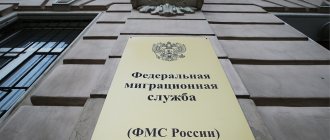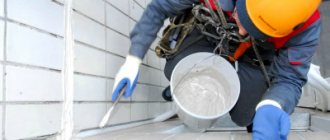Prosecutor's offices check the work of the administrative authority based on received information about violations of the law
Every management organization faces inspections by the prosecutor's office. The agency checks how the company conducts claims and claims, whether it complies with the requirements of the law on the protection of personal data, whether it correctly charges fees for housing and communal services, and much more.
Prosecutor's inspections are carried out in accordance with the norms of the Federal Law dated January 17, 1992 No. 2202-1 “On the Prosecutor's Office of the Russian Federation” and with the order of the General Prosecutor's Office of the Russian Federation dated December 7, 2007 No. 195 “On the organization of prosecutorial supervision over the implementation of laws, observance of human rights and freedoms and citizen."
According to paragraph 6 of Order No. 195, inspections of the implementation of laws are carried out on the basis of information received by the prosecutor's office, as well as other materials about committed offenses that require the use of prosecutorial powers.
This occurs after the prosecutor's office receives information about facts of violation of laws that require the prosecutor to take action, if this information cannot be confirmed or refuted without conducting the specified check.
In accordance with Art. 22 No. 2202-1, the prosecutor, when performing the functions assigned to him, has the right to demand from managers and other officials to provide the necessary documents and materials, statistical and other information.
How the MA deals with a warning, representation or order
Provocations of competitors
“Anyone can contact the prosecutor’s office and report that there may be violations of the law in a certain company and ask for attention to the work of the organization,” explains Alexander Trach. Can competitors take advantage of this opportunity to eliminate their rival? Yes, but there is a small detail. You really need to be sure that these violations take place at the enterprise. Otherwise, the applicant may be accused of libel based on the results of the audit. But in practice, this happens extremely rarely, because the statement may not state precisely, but say: there is reason to believe that violations are possible in this organization. The prosecutor's office will still have to respond to this statement and pay attention to the activities of the company. Very often, such work mechanisms lead to counter checks. That is, the party that has been subjected to control measures appeals to the prosecutor’s office to pay attention to the applicant’s activities.
“In my practice, there was a case when the prosecutor’s office became a participant in a corporate dispute. It was obvious to everyone that the owners of the same business were arguing, but these were such serious opponents that government agencies also took part in resolving the conflict. Moreover, the prosecutor initiated and took part in legal proceedings. It is clear that when a government body acts on the side of one participant, there is more trust in it. The impartial position of the judge aroused respect: written requests from government bodies to her with a request to make the correct decision in the case (which one was clearly read between the lines) were recognized as not relevant to the essence of the dispute. The conflict was resolved, but time was lost: 9 months of litigation did not allow the implementation of the investment project,” says Alexander Trach.
Prosecutor's offices do not have the right to replace other supervisory government bodies
By virtue of Part 3 of Art. 21 No. 2202-1, the decision to conduct supervisory measures is made by the prosecutor or his deputy and is brought to the attention of the head or other authorized representative of the organization no later than the day the inspection begins. The decision to conduct an inspection must indicate its goals, grounds and subject matter.
According to the position set forth by the Supreme Court of the Russian Federation in Resolution No. 86-B03-2 dated June 16, 2003, the legislation does not provide prosecutors with an arbitrary right to conduct inspections. There must be valid reasons for verification, properly documented.
At the same time, as noted in Part 2 of Art. 21 No. 2202-1, when supervising the implementation of laws, prosecutorial bodies do not replace other government bodies. At the same time, in the daily activities of management organizations, situations often arise when prosecutors carry out inspections for violations of labor laws.
According to Art. 353 of the Labor Code of the Russian Federation, federal state supervision over compliance with labor legislation and other acts containing labor law norms is carried out by the federal labor inspectorate. During inspections, she analyzes the circumstances and reasons for the identified violations (Article 356 of the Labor Code of the Russian Federation).
Thus, the body authorized to conduct inspections of organizations for compliance with labor legislation is the State Labor Inspectorate, and the powers of the prosecutor’s office do not include this type of control measures.
What to do if its rights are violated: help from the Prosecutor General's Office of the Russian Federation
Requirements for a complaint
According to Art. 41 of Law No. 248-FZ, a pre-trial complaint must contain the following mandatory items:
- name of the control (supervisory) body, full name (if any) the official whose decision and/or action (inaction) is being appealed;
- FULL NAME. (if any), place of residence (place of business) of the citizen, or the name of the organization, its location, or details of the power of attorney and full name. (if any) the person filing the complaint by proxy;
- the desired method of interaction during the consideration of the complaint and the desired method of obtaining a decision on it;
- information about the appealed decision, action (inaction) that led or may lead to a violation of the rights of the controlled person;
- grounds and arguments for disagreement with the decision, action (inaction) of an official (you can attach supporting documents or copies thereof, if available);
- the requirements of the complainant;
- registration number of the control (supervisory) activity in the Unified Register of Control (Supervisory) Activities in respect of which the complaint was filed (unless otherwise established by the Government of the Russian Federation).
The complaint must not contain:
- obscene or offensive language;
- threats to the life, health and property of officials of the control (supervisory) body or members of their families.
The following can be attached to the complaint regarding its subject:
- Commissioner under the President of the Russian Federation for the protection of the rights of entrepreneurs, his public representative;
- Commissioner for the protection of the rights of entrepreneurs in the region.
The person filing the complaint must receive a response to this position within 1 business day from the moment the decision on the complaint is made.
Checks of compliance of the management with labor legislation are beyond the competence of the prosecutor’s office
A similar situation arose with a management organization from the Yamalo-Nenets Autonomous Okrug. The prosecutor's office received a complaint from a former employee of the organization, so the department decided to conduct an unscheduled inspection of the organization.
The prosecutor's office requested from the organization copies of employment contracts, information on wages, information on termination of employment contracts and other internal documents of the organization.
Lawyers, whose client is the UO, in accordance with the request, sent all the necessary documents to the prosecutor's office. At the same time, they compiled and sent a complaint to the prosecutor's office of the Yamalo-Nenets Autonomous Okrug. In it, the lawyers indicated that in this situation the prosecutor’s office went beyond the limits of its powers, citing:
- Part 2 Art. 21 No. 2202-1;
- Resolution of the Supreme Court of the Russian Federation dated 06.06.2003 No. 86-B03-2;
- Art. Art. 353, 356 Labor Code of the Russian Federation;
- current judicial practice.
As a result, the prosecutor's office did not take any further actions within the framework of this inspection. After the complaint by lawyers in the interests of the UO, no demands were received from the department.
How to build an efficient work of lawyers and save money for a management company/homeowners association
How to appeal the result of an inspection
The customer has the right to appeal, in accordance with the procedure established by law, any action or inaction or decision of the prosecutor.
The results of the inspection are being appealed:
- in pre-trial or administrative proceedings (i.e. to a higher prosecutor);
- judicially.
When making a pre-trial appeal, the customer should contact the city or regional prosecutor's office, where the actions and decisions of the district prosecutor's office employees can be appealed. The complaint must be submitted in writing in two copies. It states:
- information about the person to whom it is sent for consideration;
- information about the applicant;
- the essence of the claim, indicating the time of application and information about the prosecutor’s office employee who made an unlawful decision or violated the applicant’s rights through his actions or inaction;
- desired requirements. For example, canceling an unlawful decision or restoring the applicant to his legal rights.
The time limits for pre-trial appeal are not regulated by law.
Appeal in court concerns decisions, protests and submissions:
- The decision is made by the prosecutor, a case of administrative offense is initiated and sent to court. The court issues a judicial act, which the customer has the right to appeal under the Code of Administrative Offences. The court considers the appeal within 2 months.
- In situations where, as part of an investigation, a supervisory authority has identified violations and a supply contract has been disrupted, the prosecutor’s office issues a submission for consideration within 30 days. If the customer refuses to take action, the case is sent to court, where it is considered within the framework of the Code of Administrative Proceedings. The court has three months to consider a claim regarding representation.
- The appeal of the protest of the prosecutor's office is carried out by analogy with the submission within the framework of the Code of Administrative Proceedings.
About the author of this article
Alexander Parshikov Practitioner, expert in procurement under 44-FZ, has extensive experience working with the customer.
Other publications by the author
- 2021.06.16 Samples How to correctly include a supplier in the RNP: instructions from the FAS
- 2021.04.06 Customer documentsInstructions for the procurement of utilities under 44-FZ
- 2020.08.25Customer documentsIs it possible to conclude an agreement after the work is completed
- 2020.08.11 Customer documents Interchangeability of drugs: what is it and how to use it according to 44-FZ
Types of complaints considered by the prosecutor's office
The most common types of appeals considered by the prosecutor's office are:
- complaints in the housing and communal services sector (incorrect calculation of utility bills, refusal to apply for a preferential housing queue, failure to provide subsidies, etc.);
- complaints about violations of labor legislation (non-payment of wages by the employer, failure to provide leave, illegal dismissal);
- complaints about violations by public authorities in the exercise of their powers (for example, inaction when considering written requests from the applicant and failure to receive a response, demands from government officials to provide documents, the provision of which is not provided for by law, etc.);
- appeals on issues of investigation and inquiry (for example, appeals to the actions (inaction) and decisions of the inquiry officer, the inquiry body and the investigator when accepting, registering and considering a report of a crime);
- appeals on issues of legality and validity of court decisions in criminal cases;
- complaints regarding administrative liability.
For reference. The prosecutor's office system includes transport prosecutor's offices that consider appeals for violations of laws in air and rail transport, transport police, and customs authorities.










